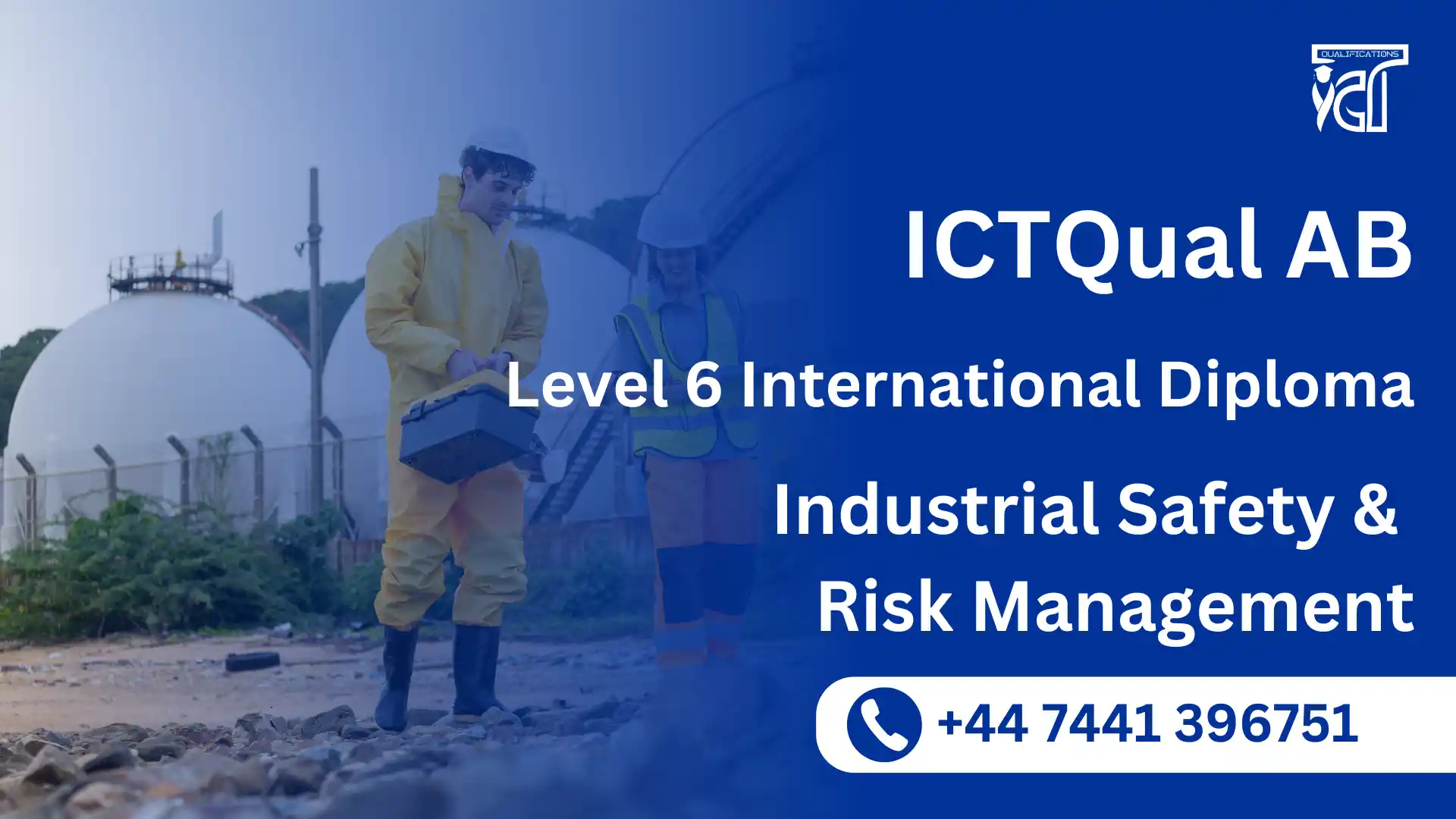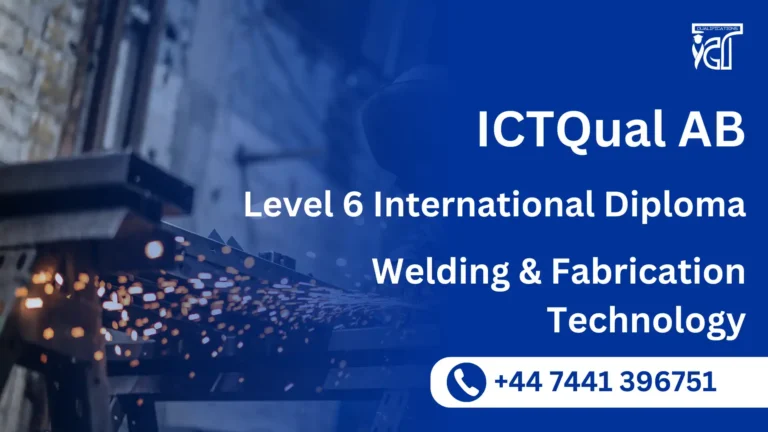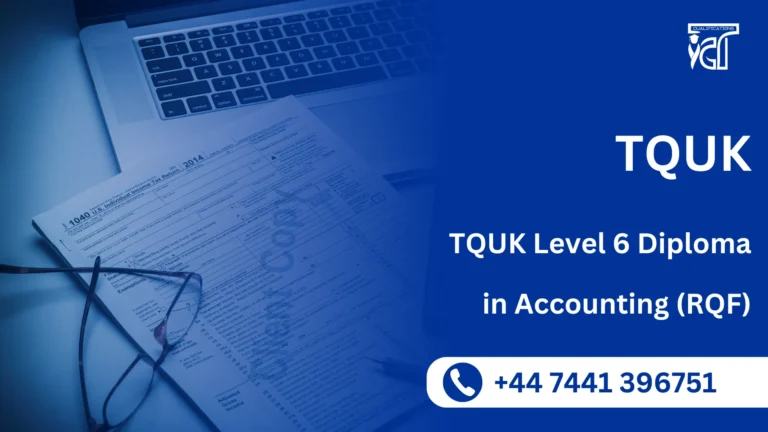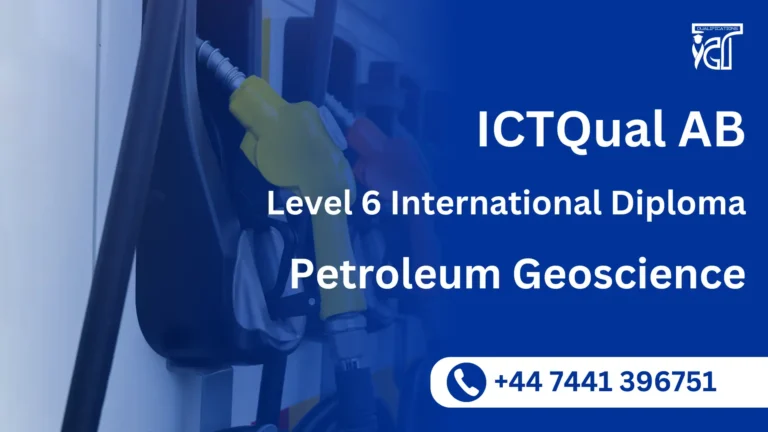The ICTQual AB Level 6 International Diploma in Industrial Safety and Risk Managementt is a comprehensive three-year programme with a 360-credit structure, designed to equip learners with advanced expertise in workplace safety, risk assessment, and regulatory compliance. This qualification is highly relevant in today’s industrial landscape, where organisations prioritise safe operations, hazard prevention, and robust risk management practices across sectors such as manufacturing, construction, oil and gas, and engineering.
This diploma is ideal for fresh learners who are entering the industrial safety field, as well as experienced professionals seeking to enhance their skills or progress into supervisory and managerial positions. Learners gain in-depth knowledge of hazard identification, risk mitigation strategies, emergency response planning, and the development of health and safety policies. The programme also emphasises practical applications, enabling learners to apply theoretical knowledge in real-world workplace scenarios.
Completing this qualification empowers learners to lead safety initiatives, conduct compliance audits, and implement effective risk management programmes. It enhances employability by preparing learners for critical roles such as safety officer, risk manager, compliance auditor, and industrial safety consultant. Beyond career opportunities, the diploma provides learners with the skills to foster safer work environments, minimise workplace incidents, and contribute to organisational efficiency and productivity.
Key benefits of this diploma include gaining internationally recognised expertise, developing leadership capabilities in health and safety management, and accessing career advancement opportunities in high-demand industries globally. By enrolling in this programme, learners position themselves for long-term professional growth, global employability, and the ability to make a tangible impact in industrial safety and risk management across diverse sectors.
ICTQual AB Level 6 International Diploma in Industrial Safety and Risk Management
This qualification, the ICTQual AB Level 6 International Diploma in Industrial Safety and Risk Managementt , consists of 36 mandatory units.
Year 1 – Foundation of Industrial Safety and Risk Management
- Principles of Industrial Safety Management
- Introduction to Risk Management in Industrial Environments
- Occupational Health and Industrial Hygiene Fundamentals
- Workplace Hazards Identification and Control Measures
- Safety Legislation and Regulatory Compliance
- Fire Safety and Emergency Preparedness
- Manual Handling and Ergonomic Safety
- Communication and Reporting in Safety Management
- Introduction to Environmental Safety and Sustainability
- Electrical and Mechanical Safety Awareness
- Incident Investigation and Root Cause Analysis
- Professional Ethics and Responsibility in Safety Practice
Year 2 – Applied Industrial Safety and Risk Management
- Advanced Risk Assessment and Hazard Control
- Safety Performance Monitoring and Auditing
- Process Safety Management and Hazardous Substances
- Industrial Safety in Manufacturing and Heavy Industries
- Safety Management in Construction and Energy Sectors
- Occupational Diseases and Preventive Measures
- Behavioural Safety and Human Factors
- Safety Culture Development and Change Management
- Safety Technology and Digital Tools
- Emergency Response Planning and Crisis Management
- Legal and Regulatory Frameworks (International Perspective)
- Research Methods and Data Analysis for Safety Management
Year 3 – Strategic Leadership in Industrial Safety and Risk Management
- Capstone Project: Practical Application of Safety Leadership
- Strategic Safety Leadership and Governance
- Integrated Management Systems (ISO 45001, ISO 14001, ISO 9001)
- Business Risk Management and Sustainability
- Advanced Occupational Health & Wellbeing Strategies
- Safety in Large-Scale Industrial Projects
- Corporate Social Responsibility and Ethical Safety Practices
- International Standards and Global Safety Frameworks
- Digital Transformation and Emerging Trends in Safety
- Policy Development and Implementation in Safety Management
- Research Project / Dissertation in Industrial Safety
- Professional Development and Lifelong Learning
Learning Outcomes for the ICTQual AB Level 6 International Diploma in Industrial Safety & Risk Management 360 Credits – Three Years:
Year 1 – Foundation of Industrial Safety and Risk Management
1. Principles of Industrial Safety Management
- Explain the fundamental principles of industrial safety and their application in workplace settings.
- Analyse organisational safety structures and their role in hazard prevention.
2. Introduction to Risk Management in Industrial Environments
- Identify types of workplace risks and hazards.
- Apply basic risk assessment methods to control hazards.
3. Occupational Health and Industrial Hygiene Fundamentals
- Understand principles of occupational health and hygiene.
- Recognise exposure risks and propose preventive measures.
4. Workplace Hazards Identification and Control Measures
- Identify physical, chemical, and biological hazards.
- Recommend suitable control strategies to mitigate risks.
5. Safety Legislation and Regulatory Compliance
- Explain key international safety legislation and standards.
- Evaluate organisational compliance with regulatory requirements.
6. Fire Safety and Emergency Preparedness
- Assess fire risks and prevention measures in industrial environments.
- Develop emergency response procedures for workplace incidents.
7. Manual Handling and Ergonomic Safety
- Apply ergonomic principles to workplace design and task management.
- Recommend practices to minimise musculoskeletal injuries.
8. Communication and Reporting in Safety Management
- Demonstrate effective safety communication and reporting techniques.
- Prepare reports and documentation to support safety compliance.
9. Introduction to Environmental Safety and Sustainability
- Recognise environmental hazards and their impact on workplace safety.
- Propose sustainable practices to minimise environmental risks.
10. Electrical and Mechanical Safety Awareness
- Identify electrical and mechanical hazards.
- Apply safe operational procedures and preventive measures.
11. Incident Investigation and Root Cause Analysis
- Conduct basic incident investigations and identify root causes.
- Recommend corrective and preventive actions.
12. Professional Ethics and Responsibility in Safety Practice
- Demonstrate ethical responsibility in workplace safety management.
- Apply professional standards to ensure safe and compliant practices.
Year 2 – Applied Industrial Safety and Risk Management
1. Advanced Risk Assessment and Hazard Control
- Conduct comprehensive risk assessments in complex industrial settings.
- Evaluate the effectiveness of control measures and recommend improvements.
2. Safety Performance Monitoring and Auditing
- Develop and implement safety monitoring systems.
- Conduct safety audits and evaluate organisational performance.
3. Process Safety Management and Hazardous Substances
- Identify process safety risks and manage hazardous materials.
- Apply industry standards to control chemical and process hazards.
4. Industrial Safety in Manufacturing and Heavy Industries
- Analyse safety risks in manufacturing and heavy industries.
- Implement sector-specific safety measures and protocols.
5. Safety Management in Construction and Energy Sectors
- Recognise hazards in construction and energy projects.
- Apply international safety standards to manage site-specific risks.
6. Occupational Diseases and Preventive Measures
- Identify common occupational illnesses and their causes.
- Develop preventive strategies to mitigate occupational health risks.
7. Behavioural Safety and Human Factors
- Analyse the impact of human behaviour on safety performance.
- Apply behavioural safety techniques to reduce incidents.
8. Safety Culture Development and Change Management
- Develop strategies to promote a strong safety culture.
- Apply change management principles to implement safety improvements.
9. Safety Technology and Digital Tools
- Utilise modern digital tools for hazard identification and reporting.
- Evaluate the effectiveness of technology in enhancing workplace safety.
10. Emergency Response Planning and Crisis Management
- Develop effective emergency response and crisis management plans.
- Evaluate preparedness and response effectiveness in industrial settings.
11. Legal and Regulatory Frameworks (International Perspective)
- Compare global safety legislation and standards.
- Apply international frameworks to ensure compliance in multinational operations.
12. Research Methods and Data Analysis for Safety Management
- Conduct research and analyse safety-related data.
- Apply evidence-based decision-making to improve industrial safety practices.
Year 3 – Strategic Leadership in Industrial Safety and Risk Management
1. Strategic Safety Leadership and Governance
- Demonstrate leadership in safety management at organisational level.
- Develop governance strategies to ensure long-term safety compliance.
2. Integrated Management Systems (ISO 45001, ISO 14001, ISO 9001)
- Apply principles of integrated management systems to workplace safety.
- Evaluate organisational performance against ISO standards.
3. Business Risk Management and Sustainability
- Assess industrial risks and develop sustainability-focused safety strategies.
- Implement risk management frameworks aligned with business objectives.
4. Advanced Occupational Health & Wellbeing Strategies
- Design workplace health and wellbeing programmes.
- Integrate wellbeing strategies into overall safety management.
5. Safety in Large-Scale Industrial Projects
- Identify and manage risks in complex industrial and construction projects.
- Apply advanced planning and control strategies for project safety.
6. Corporate Social Responsibility and Ethical Safety Practices
- Develop safety policies aligned with corporate social responsibility principles.
- Promote ethical decision-making and accountability in safety management.
7. International Standards and Global Safety Frameworks
- Analyse international safety frameworks and apply them in organisational contexts.
- Evaluate global safety compliance and performance metrics.
8. Digital Transformation and Emerging Trends in Safety
- Assess the impact of emerging technologies on industrial safety.
- Implement digital solutions to improve safety monitoring and reporting.
9. Policy Development and Implementation in Safety Management
- Develop and implement effective organisational safety policies.
- Evaluate policy effectiveness and recommend improvements.
10. Research Project / Dissertation in Industrial Safety
- Conduct independent research on a relevant industrial safety topic.
- Analyse findings and provide evidence-based recommendations.
11. Professional Development and Lifelong Learning
- Demonstrate commitment to continuous professional development.
- Apply reflective practices to enhance professional competence.
12. Capstone Project: Practical Application of Safety Leadership
- Plan and execute a comprehensive safety improvement project.
- Demonstrate integration of knowledge, skills, and strategic leadership in a practical context.
Completing this diploma equips learners with a comprehensive set of technical skills, practical knowledge, and professional expertise in industrial safety and risk management. It prepares learners to implement effective workplace safety strategies, conduct risk assessments, and lead compliance initiatives, ensuring a safe and productive environment across diverse industries. Whether learners are starting their career or seeking advanced roles, the programme provides the tools and credentials needed for long-term success and global employability.
1. Industry-Relevant Expertise
- Master advanced risk assessment techniques and hazard identification.
- Understand workplace safety regulations and compliance requirements.
- Gain knowledge of emergency response planning and occupational health policies.
- Develop skills in safety audits and accident investigation.
- Learn to implement proactive strategies to prevent workplace incidents.
2. Enhanced Career Opportunities
- Qualify for roles such as safety officer, risk manager, compliance auditor, or industrial safety consultant.
- Access opportunities across industries including manufacturing, construction, oil and gas, and engineering.
- Prepare for supervisory, managerial, and specialist roles in health and safety.
- Strengthen employability in both local and international markets.
- Increase career progression and earning potential through advanced expertise.
3. Practical and Theoretical Balance
- Combine classroom learning with hands-on practical exercises and simulations.
- Apply theoretical knowledge to real-world industrial safety challenges.
- Gain experience conducting audits, inspections, and risk evaluations.
- Develop competencies that can be immediately applied in the workplace.
- Build confidence to manage safety programmes and teams effectively.
4. Pathway to Higher Learning and Certifications
- Progress to Level 7 or postgraduate studies in occupational health, safety, or risk management.
- Pursue specialised professional certifications in industrial safety and compliance.
- Enhance qualifications for senior or consultancy roles.
- Strengthen leadership, project management, and strategic planning skills.
- Establish a foundation for continuous career and academic growth.
5. Long-Term Professional Growth
- Develop leadership skills to manage teams and projects in industrial safety.
- Contribute to creating safer, more productive workplaces.
- Stay updated with evolving safety standards and best practices.
- Build a globally recognised profile in industrial safety and risk management.
- Achieve sustainable career progression in a high-demand, internationally relevant sector.
This diploma is designed for learners who are committed to advancing their knowledge and careers in industrial safety and risk management. It accommodates both fresh learners entering the sector and experienced professionals seeking career growth or leadership roles.
1. Fresh Learners and Career Starters
- Individuals eager to begin a career in industrial safety and risk management.
- Learners seeking a strong foundation in risk assessment, workplace safety, and compliance.
- Candidates motivated to develop both theoretical knowledge and practical skills.
- Those aiming to secure entry-level positions across industries such as manufacturing, construction, or oil and gas.
- Learners looking for internationally recognised qualifications to enhance employability.
2. Experienced Professionals
- Professionals currently working in safety, health, or related industrial roles who want to upgrade their qualifications.
- Learners aiming for supervisory, managerial, or specialist positions in industrial safety.
- Individuals seeking to align their expertise with global industry standards.
- Those looking to lead safety programmes, conduct audits, or manage compliance initiatives.
- Professionals seeking international career opportunities and long-term growth.
3. Career Changers and Ambitious Learners
- Individuals from engineering, technical, or management backgrounds interested in transitioning into industrial safety.
- Learners aiming to gain specialised knowledge in risk management and occupational safety.
- Candidates motivated to enhance global employability in high-demand sectors.
- Those interested in fostering safer, more productive work environments.
- Learners committed to continuous professional development and leadership in industrial safety.
Completing the ICTQual AB Level 6 International Diploma in Industrial Safety and Risk Management opens multiple pathways for learners to advance academically, professionally, and globally. Graduates gain the expertise and credentials needed to pursue higher studies, leadership positions, specialist roles, and international career opportunities, positioning them for long-term success in industrial safety and risk management.
1. Higher Academic Pathways
- Progress to Level 7 or postgraduate programmes in occupational health, safety, or risk management.
- Pursue advanced research opportunities in industrial safety or related fields.
- Strengthen qualifications for doctoral studies in safety, engineering, or management.
- Access specialised courses in workplace risk and safety innovation.
- Enhance academic credentials to support career advancement.
2. Specialist Certifications
- Obtain professional certifications in advanced risk management, safety auditing, or compliance.
- Gain expertise in environmental health and workplace safety management.
- Align skills with global standards and industry best practices.
- Enhance credibility for consultancy or advisory roles.
- Develop targeted expertise in high-demand industrial sectors.
3. Senior Career Roles
- Qualify for managerial, supervisory, or consultancy positions in industrial safety.
- Lead safety programmes and compliance initiatives within organisations.
- Oversee risk assessment, audits, and regulatory compliance strategies.
- Increase earning potential and professional influence.
- Transition into leadership roles across industries and international markets.
4. Global Employment Opportunities
- Access roles in international industrial and engineering markets.
- Strengthen employability in resource-rich and industrially developed regions.
- Work on cross-border projects requiring advanced OHS expertise.
- Contribute to global initiatives in workplace safety and risk management.
- Gain exposure to diverse industrial practices and international standards.
5. Entrepreneurial and Industry Innovation
- Establish or expand businesses in industrial safety consulting or risk management services.
- Lead innovation and improvement initiatives within organisations.
- Develop solutions for workplace safety challenges and regulatory compliance.
- Build a reputation as an expert in industrial safety and risk management.
- Create long-term professional impact while driving sector advancement.
As an approved ICTQual AB training centre, we provide learners with two distinct certification routes to match their experience and career aspirations. Learners must enrol with our centre to access these pathways and benefit from expert guidance throughout the programme.
Route 1: Experienced Professionals
This route is tailored for learners who have at least 6 years of verifiable experience in industrial safety, risk management, or related sectors. Supervisory or managerial experience is highly advantageous.
- Eligibility: Learners provide documented proof of relevant work experience.
- Competence Assessment: Learners are evaluated to ensure their existing knowledge and skills meet the programme’s learning outcomes.
- Targeted Support: Any skills gaps are addressed through focused assignments or learning modules.
- Certification: Upon successful verification of competence, learners are awarded the ICTQual AB Level 6 International Diploma in Industrial Safety and Risk Management without completing the full three-year programme.
Route 2: Fresh Learners
This route is ideal for learners who are new to industrial safety and risk management.
- Enrolment: Learners join the programme at our ICTQual AB approved centre.
- Training: Learners complete the full three-year programme, covering 36 assignments that include theoretical lessons, practical exercises, case studies, and project work.
- Assessment: Learners are evaluated through assignments, project-based assessments, and workplace simulations aligned with the learning outcomes.
- Certification: Upon successful completion of all assignments and assessments, learners are awarded the ICTQual AB Level 6 International Diploma in Industrial Safety and Risk Management.
Entry Requirements
To ensure learners are fully prepared for the demands of this advanced qualification, the following entry requirements apply:
1. Minimum Age
- Learners must be 18 years or older at the time of enrolment.
2. Educational Background
- A Level 5 qualification or an equivalent diploma in occupational health & safety, industrial safety, engineering, or a related technical field is preferred.
- Candidates with a strong secondary education and relevant technical knowledge may also be considered.
3. Experience
- Route for Experienced Professionals: Learners should have a minimum of 6 years of verified experience in industrial safety, risk management, or related sectors. Supervisory or managerial experience is advantageous.
- Route for Fresh Learners: Candidates without prior experience can enrol in the full programme and must complete all 36 assignments to meet course requirements.
4. Language Proficiency
- Learners must demonstrate proficiency in English, both written and spoken, to engage effectively with course content and assessments.
- For non-native speakers, an IELTS score of 5.5 (or equivalent) is recommended.
These entry requirements ensure that both fresh learners and experienced professionals can successfully complete the three-year, 360-credit programme and gain the internationally recognised ICTQual AB Level 6 Diploma in Industrial Safety & Risk Management.
Register Now
Qualification Process
Qualification Process for the ICTQual AB Level 6 International Diploma in Industrial Safety and Risk Management
- Self-Assessment:
Begin by evaluating your eligibility to ensure you meet the qualification requirements, including work experience, knowledge, and language proficiency. - Registration:
Complete your registration by submitting the required documents, including a scanned copy of a valid ID, and paying the registration fee. - Induction:
An assessor will conduct an induction to confirm your eligibility for the course and explain the evidence requirements. If you do not meet the criteria, your registration will be cancelled, and the fee will be refunded. - Assignments & Evidence Submission:
Provide all assignments and the necessary evidence based on the assessment criteria outlined in the course. If you are unsure of the required evidence, consult with the assessor for guidance on the type and nature of evidence needed. - Feedback and Revision:
The assessor will review your submitted evidence and provide feedback. Evidence that meets the criteria will be marked as “Criteria Met,” while any gaps will be identified. You will be asked to revise and resubmit if needed. - Competence Evidence:
Submit final evidence demonstrating that all learning outcomes have been met. This evidence will be marked as “Criteria Met” by the assessor once it is satisfactory. - Internal Quality Assurance (IQA):
The Internal Quality Assurance Verifier (IQA) will review your evidence to ensure consistency, quality, and compliance with standards. - External Verification:
The IQA will submit your portfolio to ICTQUAL AB External Quality Assurance Verifiers (EQA) for final confirmation. The EQA may contact you directly to verify the authenticity of your evidence. - Certification:
Upon successful completion of all checks, ICTQUAL AB will issue your official certificate, confirming that you have attained the ICTQual AB Level 6 International Diploma in Industrial Safety and Risk Management.







